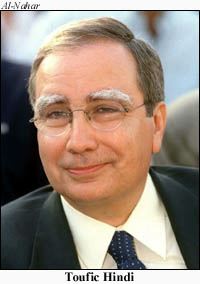 |
| Vol. 3 No. 12 | Table of Contents MEIB Main Page | December 2001 |
 |
Statistics: Syrian-Lebanese Trade Imbalance
Trade between Lebanon and Syria grew by 28% during the first six months of 2001, according to a report released by the Syrian-Lebanese Higher Council. Syria's exports to Lebanon totaled $159 million, while Lebanese exports to Syria amounted to only $16 million.
Although barriers to the entry of Lebanese goods into Syria have ostensibly been reduced, Lebanese businesses frequently complain that goods destined for Syria are blocked at the border for up to six months.
Former MPs Who Signed 1989 Ta'if Accord Call for Syrian Withdrawal
The Gathering for the Constitution and National Accord, a reformist group established by former Prime Minister Rashid al-Solh and other politicians who signed the 1989 Ta'if Accord, which called for an eventual Syrian pullout from Lebanon but legalized its presence in the interim, released a statement on December 14 calling for the restoration of Lebanese sovereignty. The statement expressed opposition to the "the presence of Syrian troops" in Lebanon and the "presence of military islands," a reference to Palestinian refugee camps, which Syria has prevented the Lebanese armed forces from entering. The statement also complained about the refusal of successive Syrian presidents to visit Lebanon (which, like Syria's refusal to open an embassy in Beirut, is intended to avoid recognition of Lebanon as an independent state). "For the past 27 years, Lebanon has been waiting for the visit of the Syrian President in response to the tens of visits that the Lebanese president had paid."
The 1989 Ta'if Accord, signed by the surviving members of Lebanon's last elected parliament (1972), permitted Damascus to maintain troops in Lebanon until the Syrian and Lebanese governments jointly determined a withdrawal date (which, due to Syrian control over the electoral process in Lebanon and the selection of presidents and prime ministers, has still not happened). The parliamentary delegates were assured by Saudi and American officials that Syria would withdraw after the restoration of government authority in Lebanon.
Released Detainees Recount Torture by Security Forces
Two members of the Lebanese Forces (LF) who were freed on bail this month after nearly four months of detention, Salman Samaha, the head of the movement's student organization, and lawyer Elie Keyrouz, recounted their experience in prison in interviews with Al-Nahar.
"They tried to tear me apart. They tied my ankles in rope and pulled hard in opposite directions," said Keyrouz. "They beat me and slapped me and kept me blindfolded and chained for many days and nights." Samaha recounts being blindfolded and hearing Keyrouz "screaming in agony" from a nearby cell.
Both Keyrouz and Samaha said they signed confessions out of fear that they would be subject to further torture. The two are expected to stand trial on charges that they withheld information pertaining to a criminal investigation from the authorities.